Community Teacher Days - editions 3.1 and 3.2!
Exchanging experiences on collaboratively creating exercises, summative testing, activating students, and accommodating different knowledge levels.
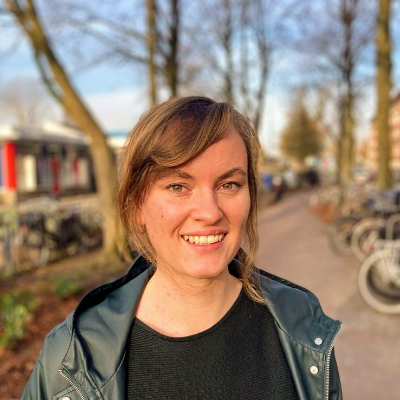
by Ellen Hoefsloot
Project Manager at Grasple
On November 25th and 26th we hosted the third edition of Grasple Community Teacher Days! Grasple Community Teacher Days are an opportunity for educators to exchange experiences, best practices, and challenges relating to online education with each other.
To ensure that the Grasple Community Teacher Days connect to the distinct experiences of educators in different settings, this time around we hosted two separate sessions; one for University lecturers and one for educators from Applied Universities.
Below you will find a selection of the insights and experiences of our community. Watch the recordings of the events if you want to hear and see more!
- Session 25 November, 2020 - University session
- Session 26 November, 2020 - Applied University session
University lecturers on collaboratively curating and creating exercises
Our session on November 25th was kicked off by Pim Stuurman from Grasple and Steffen Posthuma from the University of Twente (UT).
They have been collaborating closely to build a collection of practice materials for the different Mathematics courses in the first-years Engineering curricula. Most of these materials were originally created by faculty from the Delft University of Technology (TUD), and shared with UT through Grasple. This means there was no time wasted in recreating existing materials - exactly what we hope to facilitate at Grasple! The challenge has been to add to and adapt the shared materials to create a complete and tailored collection of exercises for the UT, while also making them suitable for sharing in the Grasple Community repositories. This has been, and still is, an iterative process.
University lecturers on creating exercises in Grasple: Inspiring examples and necessary trade-offs
After a fruitful discussion about collaboration, we gave the floor to Anny Rey Naizaque (UT) and Iris Monster (Radboud University). They shared some inspiring examples of exercises which challenge and guide students, and which test the limits of Grasple!
Anny shared how she is using Grasple’s Conditional Logic feature to build a system of exercises which adapts to a student’s current mastery level of a subject. Based on the answer a student enters for a given question, they are presented with an easier or a more difficult question - taking each student through different steps to reach a final question or an instructional video. Anny’s system has not been tested by students yet, but she will let us know when she can share the experiences of students with the branching tree setup.
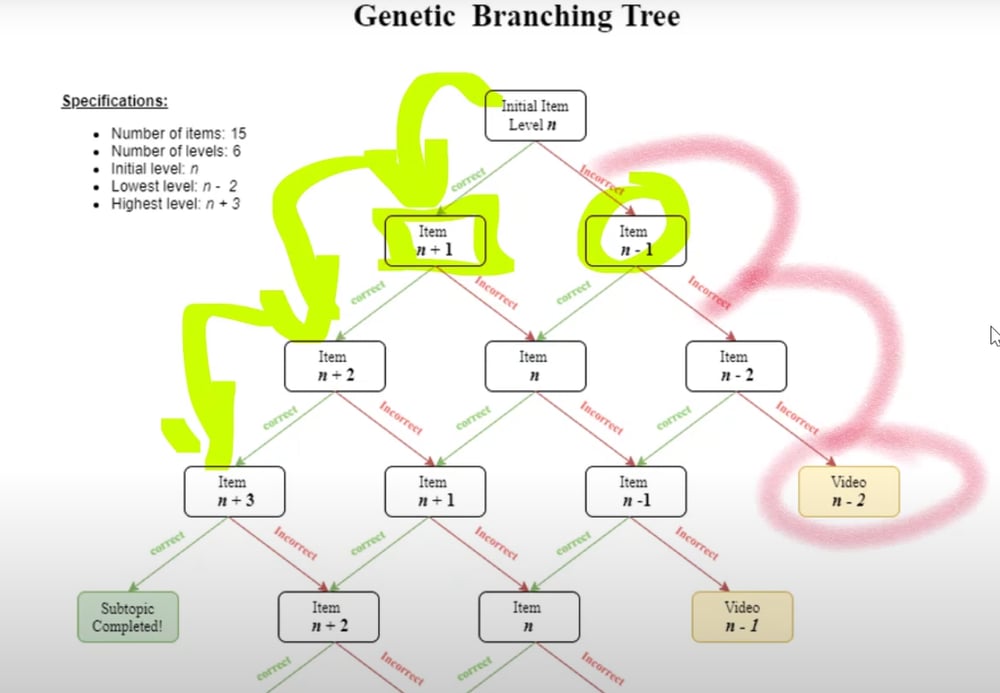 Anny Rey Naizaque (UT): Guiding students with Conditional Logic
Anny Rey Naizaque (UT): Guiding students with Conditional Logic
Following Anny, Iris Monster showed us how her team at Radboud University (RU) get creative to build fully parameterized Statistics exercises in Grasple. In order to create their complex exercises, they deconstruct the intended exercise into several smaller steps - mirroring the steps a student needs to take to solve the problem. These steps are parameterized individually, and then merged into one or a few high-level exercises to present to students. This way students develop their problem solving skills in addition to developing their statistics knowledge.
Have a look at this article for more about the possibility of parameters in exercises!
 Iris Monster (RU): Creating complex exercises through creative parametrization
Iris Monster (RU): Creating complex exercises through creative parametrization
And to finish the session, Iris Smit (TUD) shared five trade-offs she encounters when creating exam questions in Grasple. Making these trade-offs is necessary because of limited resources, and the right balance between them in a continuing point of discussion within her team. With that, she left us with enough inspiration for multiple future Grasple Community Teacher Day conversations!
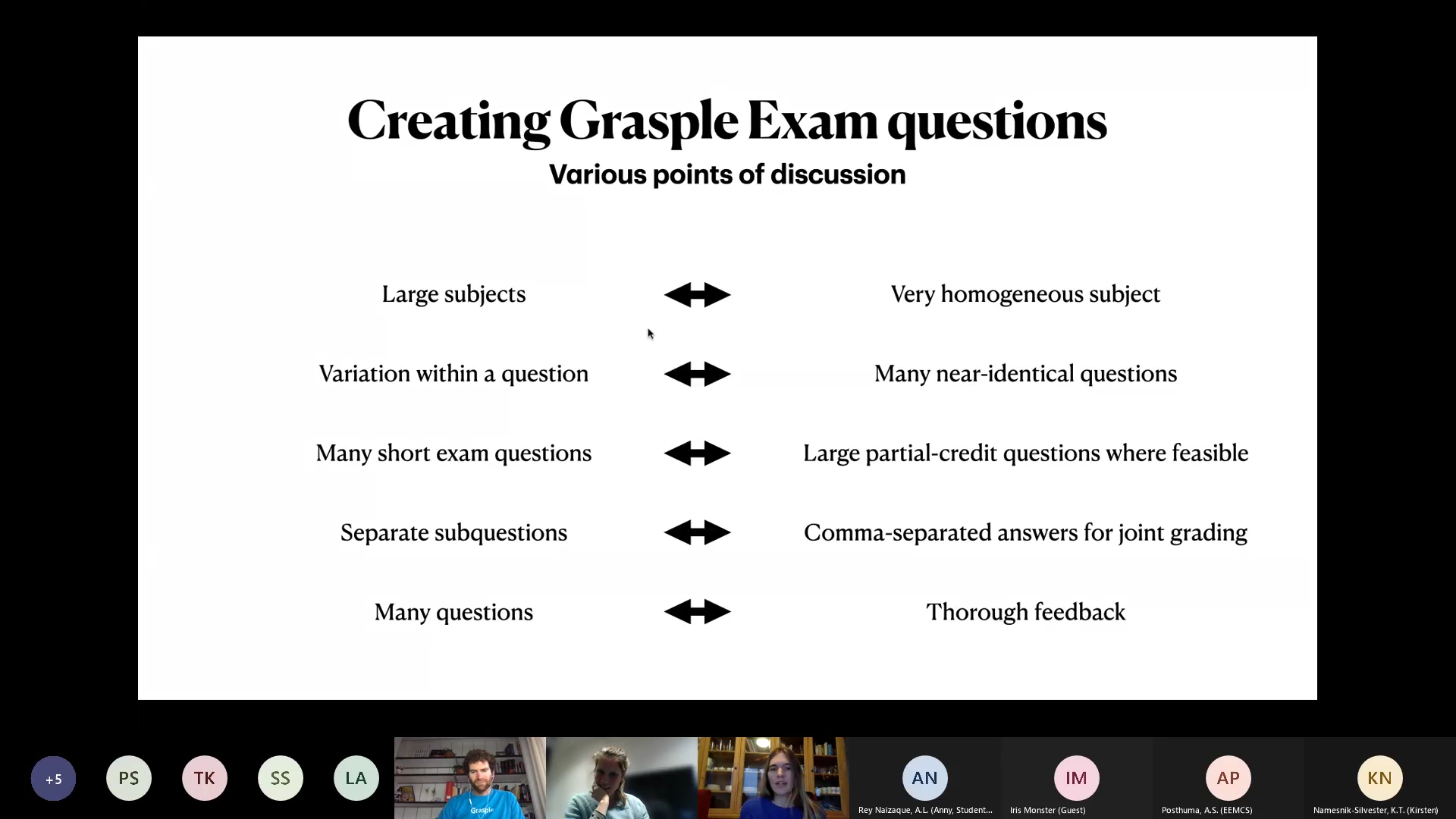 Iris Smit (TUD): Trade-offs when making exam questions
Iris Smit (TUD): Trade-offs when making exam questions
In sharing their experiences, Steffen, Iris Monster, and Iris Smit raised several important questions about collaborating, and our community was happy to chime in with their insights and suggestions!
-
How can we find a happy balance between tailoring materials to the didactic preferences of our lecturers, while also making the materials shareable?
The fact that this is a tricky balance to strike was endorsed by multiple people. There were a few suggestions for possible solutions:
Mix contexts in your course: among them the idea that educators can learn to use materials that do a good job of explaining concepts, albeit with examples from different contexts than they are used to.
Keep subjects and exercises modular: another good suggestion is to share individual exercises about a specific topic, rather than sharing complete lessons. This modular approach makes it easier for other lecturers to browse, select, and organise exercises in a way that make sense for their course. -
How do we set up a clear and workable framework for collaboration? Collaboration requires ground rules which detail who does what and how. For example, it can help to keep the collaboration organised if everyone agrees on who is allowed to edit (given different scenarios), how people without edit-rights can communicate their suggestions, and how they can expect their suggestions to be processed.
-
How can we keep an up-to-date overview of all the different materials (being) created, and of the different people creating them?
Keeping track of the status of all individual exercises in a large collection of materials is crucial and challenging, as we heard from several of our attendees. At TUD, they use a system of multiple repositories which contain exercises in different stages of production (Development, Checked, and Ready to Use) as well as a shared workflow sheet which is kept up-to-date by everyone who is involved in the creation of exercises. This system relies on the conscientiousness of everyone involved to work well, and benefits from one or a few coordinators who make sure everyone knows the rules.
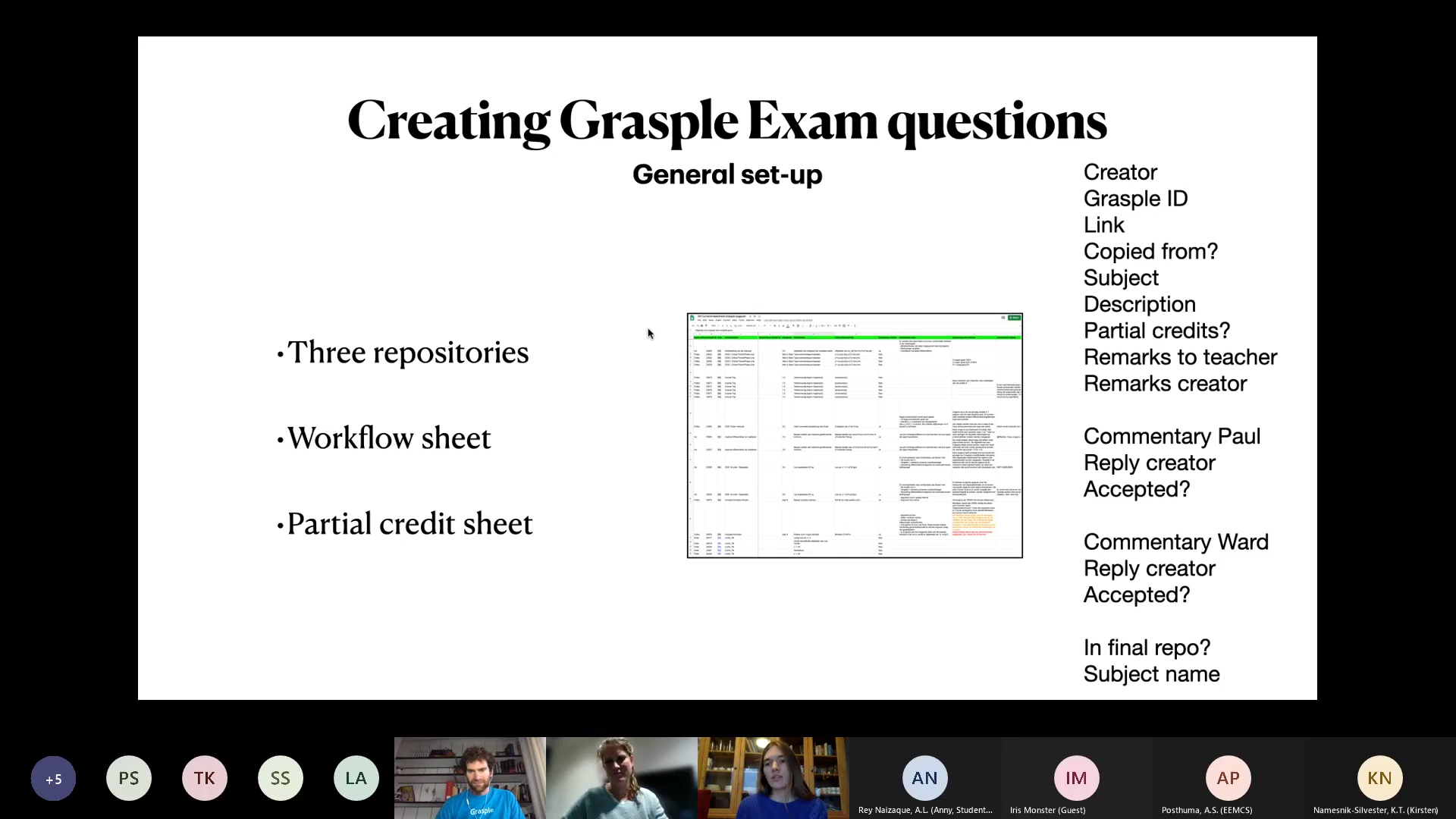 Iris Smit (TUD): A system for keeping track of collaboratively created materials
Iris Smit (TUD): A system for keeping track of collaboratively created materials
Applied Universities session: Accommodating different knowledge and skill levels
On November 26th, Marloes Zutt from the Amsterdam University of Applied Sciences (HvA) kicked off the session by sharing how her team has designed a modular course in which they can accommodate 800 first-years students enrolled in different tracks within the ICT faculty, and with different backgrounds and mathematics skills.
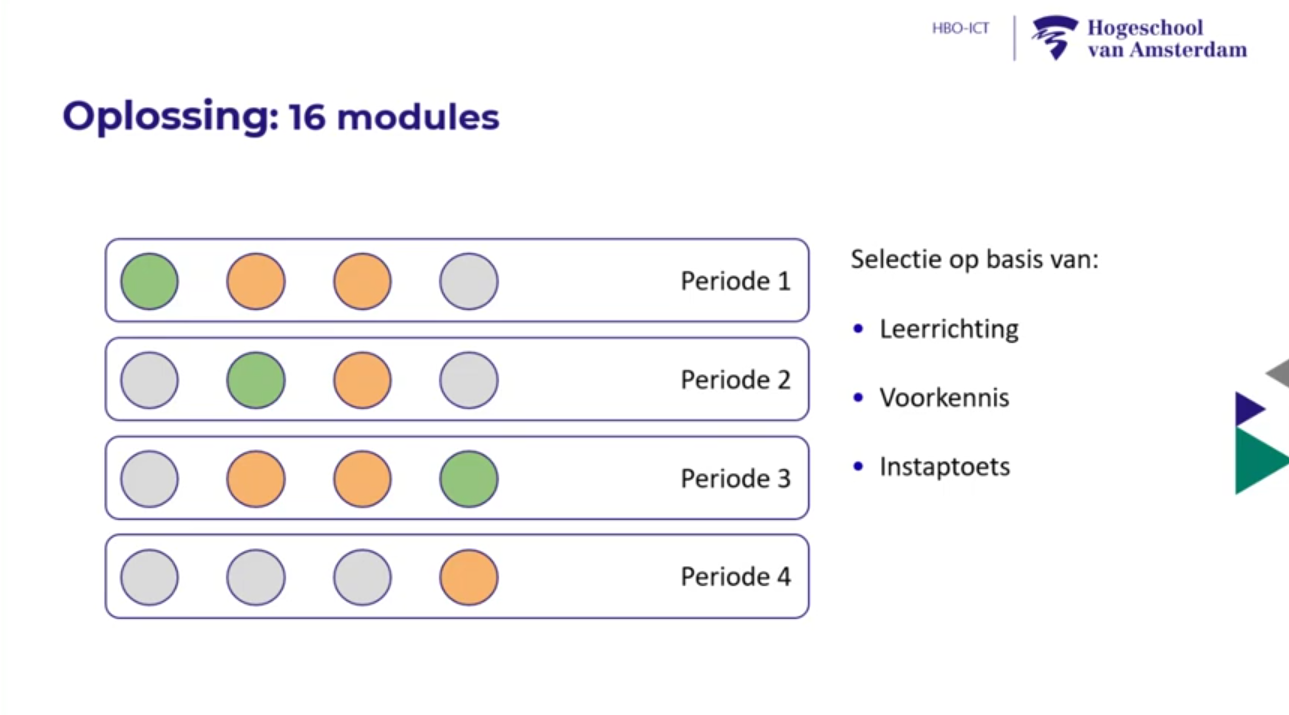
Marloes Zutt (HvA): Modular mathematics course to accomodate different requisite knowledge and skill-levels. Module selection is based in requisite knowledge for ICT track, prior knowledge, and the results of a diagnostic test.
The full course consists of 16 modules taught over four quartiles. Each individual student gets their own personalised course plan based on three criteria:
- The requisite knowledge of their chosen track within the ICT faculty determines which modules they have to complete before the end of the year
- Based on the math curriculum in their prior education, they can get dispensations for specific modules
- They can also earn dispensations based on their results on the diagnostic test at the beginning of the year
This setup allows students to focus on the topics which they don’t master yet, and was received enthusiastically by the other attendees!
An interesting question posed by Marloes was whether or not it’s reasonable to equate prior education to prior knowledge. A degree should (and in many cases: does) provide proof of the knowledge or skill level someone possesses. But, if the degree is not recent, some of that knowledge may have been forgotten and could do with brushing up. This issue can be resolved by introducing a diagnostic test.
Sneak preview: Using Grasple Diagnose to check skill level
To illustrate how educators can use Grasple to create a similar setup to the one demonstrated by Marloes, Pim (Grasple) gave us a sneak preview of Grasple Diagnose. Diagnose is an adaptive diagnostic test that maximizes insight into what students master in the minimum amount of questions. Diagnose uses machine learning algorithms and leverages the relations between subjects to create a detailed map of student mastery of all subjects within a course. This is translated into colour codes which guide students through their course map - showing them what to focus on during their studies.
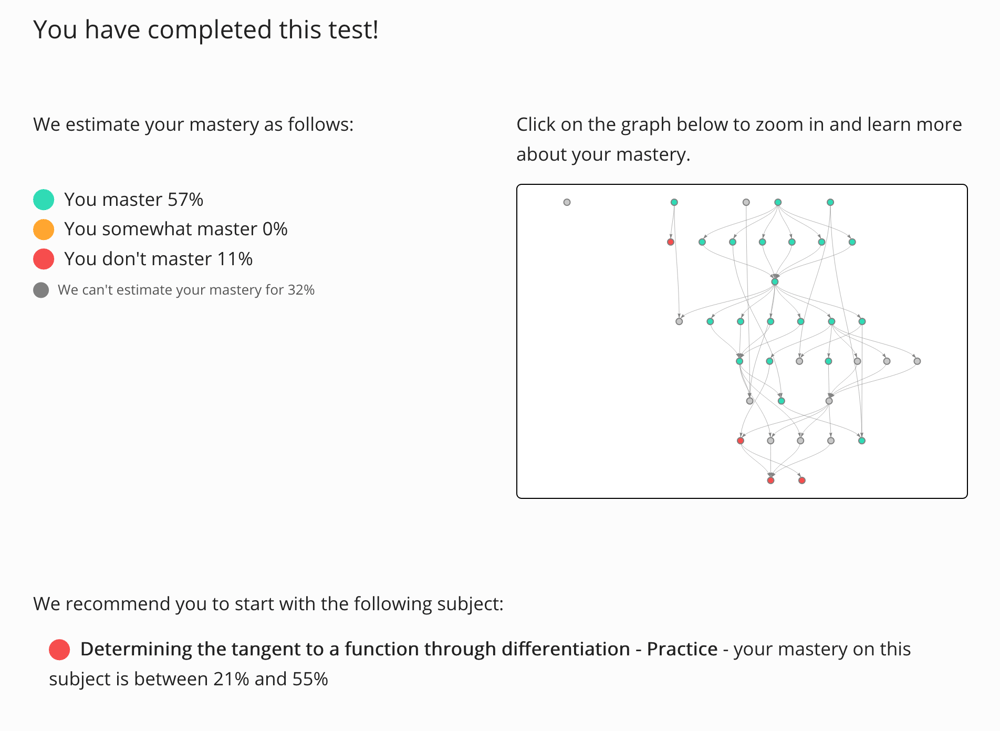 Pim (Grasple): Using links between knowledge components to determine mastery of a subject in the minimum amount of questions.
Pim (Grasple): Using links between knowledge components to determine mastery of a subject in the minimum amount of questions.
Applied Universities session: Activating students by providing the right context
After getting inspired by Marloes’ and Pim’s presentations about identifying and accommodating different knowledge and skill levels, we moved on to the second topic of the session: Activating students in online courses. Two educators who have been very successful in activating their students are Huib van de Kop from HvA and Michelle Schefman from Hotelschool the Hague (HTH).
Huib teaches future Physical Education teachers how to critically examine the outcomes of their education interventions by rigorously gathering and analysing data. PE teachers are (usually) very practice-oriented people. In order to engage and activate their students, Huib and his colleagues have created a curriculum in which Statistics and Research Methods are woven into the entire first year. Theory - taught using Grasple - goes hand in hand with application to real-world cases and during internships, making the subjects relevant for the students.
Michelle (HTH) teaches an intensive eight-week Research Methods course for future hospitality professionals. The theoretical part of the course consists of exercises in Grasple and a textbook for reference and background. In order to make sure students can keep pace with the course, they are required to work through the theory independently and before coming to class. This allows Michelle and her students to have meaningful discussions about the application of theory during the weekly practice-oriented workshops.
There are parallels between the approaches of Huib and Michelle, which tell us something about best practices when it comes to activating students in online courses:
- Embedding theory in the relevant context helps students to understand its value for their future careers.
- Focussing on discussion and application during class makes for more stimulating lectures (for both students and teachers!). Discussion lectures benefit from good preparation on the part of students, which can be stimulated by making homework assignments mandatory.
We are very grateful to have such an open and constructive community of educators. A big thanks to all the speakers who were willing to share their best practices and challenges, and to everyone who attended for your insightful questions and contributions!
Were you not able to attend? Watch the recordings of the Teacher Days below!
Grasple University Teacher Day
Grasple University of Applied Sciences Teacher Day
Want to stay up to date about future community news and updates? Join hundreds of statistics, math, science, and research educators and sign up for the (monthly) newsletter:
We e-mail once a month. We promise we value your inbox, so no spam.




